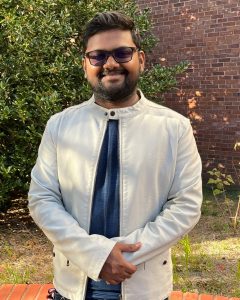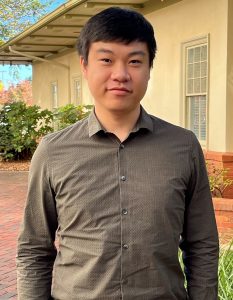ECE Announces Its Fall 2022 Research Symposium Awards
November 10, 2022
The Department of Electrical and Computer Engineering recently announced the winners of its annual ECE Research Symposium.
Graduate students Sabyasachi Biswas and Tingjun Lei both received Best Presentation awards for their work. Biswas, advised by Dr. Ali Gurbuz, was awarded for his presentation titled “Multi-target Activity Classification with MIMO Radar.” Lei, advised by Dr. Chaomin Luo, won for his presentation “Autonomous Robot Coverage Path Planning System.”

Sabyasachi Biswas
Sabyasachi Biwas noted that the research symposium allowed him the opportunity to present his work, noting multi-target recognition is challenging because conventional micro-Doppler processing results in the superposition of target signatures, making it difficult to separate and identify multiple targets.
“In this work, we proposed an angular subspace projection technique for separating the raw radar signal components of different targets in both range and angle to allow micro-Doppler signature separation in multi-target cases,” Biwas said. “Our results show that both qualitatively and quantitatively the separated target signatures exhibit great similarity to signatures acquired in a single-target configuration.”
He said that working with Dr. Gurbuz has helped expand his knowledge and that this department event allowed him to develop his skills.
“As a graduate student, it is important to know and learn about other researchers in our department. Every week we have long discussions about research. My professor helped me to create the research background,” he said.
Tingjun Lei also thanked his professor Dr. Chaomin Luo for his guidance with his presentation and in his graduate work.

Tingjun Lei
“I would like to thank my major professor, Dr. Chaomin Luo, for his consistent guidance and encouragement. Dr. Luo is passionate about research and is committed to passing on his spirit to me. He encourages and inspires me to conduct innovative research and is very concerned about my research progress. He also develops my abilities in all aspects. He encouraged and supported me to attend several conferences to deliver my papers and communicate with others.”
Lei’s presentation focused on helping improve autonomous robots because of their introduction into the precision agriculture process.
Lei said, “A robotic system for detecting and collecting dead broilers in a barn is a promising direction for solving the issue of broiler mortality removal. Aiming at this vision, we have developed an informative planning protocol-based multi-layer robot navigation system through detection and removal robots.”
Both Biswas and Lei will receive $250 as winners of the ECE Research Symposium. The event was judged by ECE faculty members Drs. Junming Diao, Jenny Du, Ali Gurbuz, Chun-Hung Liu, Chaomin Luo, Vuk Marojevic, and Bo Tang.
The full list of presentations included the following:
- Radio Frequency Interference Detection and Mitigation with Deep Learning Using Antenna Counts
Authors: Ahmed Manavi Alam, Ali Gurbuz, and Mehmet Kurum
- Learning Optimal Discrete Color Filter Arrays with Neural Networks
Authors: Cemre Omer Ayna, and Ali Cafer Gurbuz
- Multi-target Activity Classification with MIMO Radar
Authors: Sabyasachi Biswas, Emre Kortoglu, Ali C. Gurbuz, and Sevgi Z. Gurbuz
- Deep-learning based Global Soil Moisture estimation using CYGNSS Delay Doppler Maps
Authors: M M Nabi, Volkan Senyurek, Ali Gurbuz, and Mehmet Kurum
- Class-aware Fish Species Recognition Using Deep Learning for an Imbalanced Dataset
Authors: Simegnew Alaba, M M Nabi, Chiranjibi Shah, Jack Prior, Matthew Campbell,
Farren Wallace, John Ball, and Robert Moorhead
- Hyperspectral image change detection using deep learning and band expansion
Authors: Sadia Alam Shammi and Qian Du
- Interference mitigation and side lobe level reduction with UAV Swarm-based Phased-Array Isotropic Beamforming System
Authors: Bidya Debnath and Junming Diao
- Generative Federated-Adversarial Network for Massive MIMO Channel Estimation
Authors: Roza Jalali Farahani and Chun‐Hung Liu
- 3D Spectrum Sensing for UAV-Enabled Cellular Networks
Authors: Md Asif Syed and Chun‐Hung Liu
- Open Source Software Radio Platform for Research on Cellular Networked UAVs
Authors: Aly S. Abdalla, Keith Powell, Andrew Yingst, Joshua Moore, and Vuk Marojevic
- Coexistence of Heterogeneous Services in 5G and Beyond: A Robust Deep Q-Network Scheduler
Authors: Walaa AlQwider, Talha Faizur Rahman, and Vuk Marojevic
- Common Mode (CM) EMI Analysis and Reduction Topology in Networked DC-AC System
Authors: Ashik Amin, Ranjan Subedi, and Seungdeog Choi
- Dynamic Partitioning of Neural Networks for Low Latency Applications
Authors: Nitish Patil and Yu Luo
- Autonomous Robot Coverage Path Planning System
Authors: Tingjun Lei and Chaomin Luo
- A Node Selection Algorithm to Graph-Based Multi-Waypoint Optimization Navigation and Mapping
Authors: Timothy Sellers and Chaomin Luo
- Evaluating Graph-Based Multi-Waypoint Optimization with Node Selection
Authors: Huston Rogers and Chaomin Luo
The Department of Electrical and Computer Engineering at Mississippi State University consists of 27 faculty members (including 6 endowed professors), 7 professional staff, and over 700 undergraduate and graduate students with approximately 100 being at the Ph.D. level. With research expenditure of the department in excess of $11.94 million, the department houses the largest High Voltage Laboratory among North American universities.
